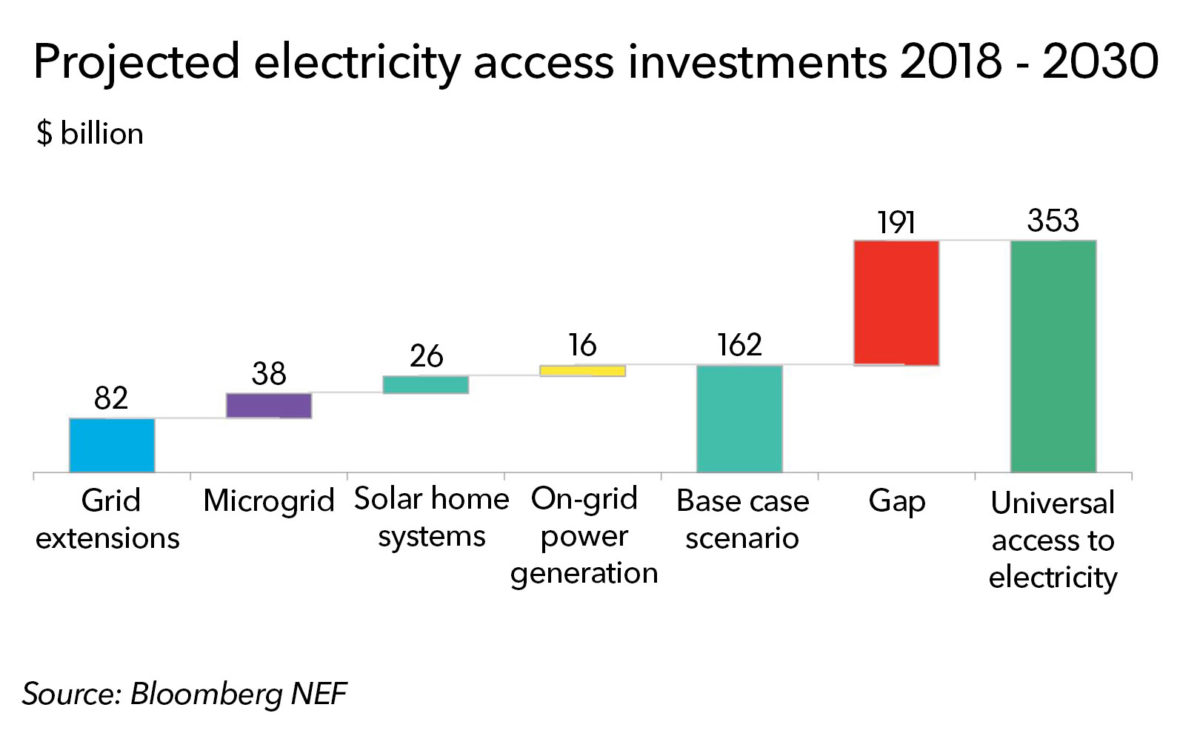In the wake of the Sustainable Development Goal conference underway this week at UN headquarters in New York, Bloomberg NEF has released an analysis on the potential for off-grid solar PV to meet the clean energy demands of the estimated 1 billion people currently living without access to electricity.
According to the analysis, there are five key factors that indicate off-grid solar PV is going to play a pivotal role in providing universal energy supply.
High grid connection costs
Chief among these factors is the cost of power grid expansion. The analysis stipulates that it could range between US$266 and $2,100 per household to establish a connection. In high-income areas, this is less of a problem, as households are equipped to pay additional energy prices. Additionally, energy prices would climb higher in low-income areas, as the grid operators have to amortize the installation with modest energy consumption.
Bloomberg NEF calculates that energy from solar home systems costs around $1.5/kWh and if sourced from microgrids, would be $0.29-0.77/kWh. The report goes on to claim that the costs of electricity after a new connection would be $1/kWh, hence higher than the costs of energy if a microgrid is deployed.
$64 billion market by 2030
Secondly, the analysts say that the market for solar home systems and microgrids will be a $64 billion market by 2030. Accordingly, some 15% of the people without access to electricity live in urban areas. Utilities would focus on extending the grids to these areas, the analysis continues.
However, by the mid-2020s decentralized technologies would have established supply chains and cheaper components. Furthermore, at that point, there would be fewer regions in which competition between grid extension and microgrids is economically viable. Based on these assumptions, the Bloomberg team holds that out of 238 million households to receive electricity supply until 2030, 72 million would use solar home systems and 34 million would source energy from microgrids.
Cheaper than expected
Bloomberg NEF analysts estimate that universal electricity supply could be attained at $353 billion, which is nearly half of what the IEA estimated on a different occasion. However, Bloomberg NEF does highlight that the IEA attributes a pivotal role to microgrids in attaining universal energy supply. According to the analysts, the IEA does estimate system costs to be above those that the market already experiences.
Microgrid development has gone commercial
Large oil and energy companies, such as Shell, have in-house teams to build microgrids and sell solar home systems at large scale. Reportedly, six of the 20 largest oil and energy companies made commitments to deliver energy access to 52 million people by 2020. The analysts highlight that these efforts are driven out of charity, but spring from the rigid business development plans for emerging markets. These efforts would underline the economic case for microgrids
Private sector enables this potential
The analysis concludes to elaborate that the switch from centralized power generation assets to decentralized off-grid systems would have a profound effect on the manner electricity systems are deployed, improved and maintained. This change leaves a gap for entrepreneurship to fill. According to the Bloomberg NEF analysis, the ways by which energy is retailed and distributed can be reinvented entirely and optimized. According to the analysts calculations, adding day-time load from agricultural activities, such as irrigation or cold storage could reduce the cost of microgrid energy by some 18%.
This content is protected by copyright and may not be reused. If you want to cooperate with us and would like to reuse some of our content, please contact: editors@pv-magazine.com.




By submitting this form you agree to pv magazine using your data for the purposes of publishing your comment.
Your personal data will only be disclosed or otherwise transmitted to third parties for the purposes of spam filtering or if this is necessary for technical maintenance of the website. Any other transfer to third parties will not take place unless this is justified on the basis of applicable data protection regulations or if pv magazine is legally obliged to do so.
You may revoke this consent at any time with effect for the future, in which case your personal data will be deleted immediately. Otherwise, your data will be deleted if pv magazine has processed your request or the purpose of data storage is fulfilled.
Further information on data privacy can be found in our Data Protection Policy.